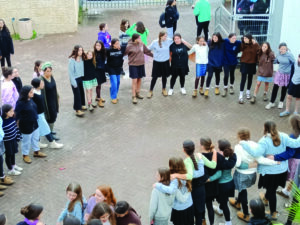They got into another person’s head. They got into another person’s body. They got to see first-hand the challenges of having a disability, and then they were challenged with figuring out how to create solutions.
AMIT students from the Academy of Entrepreneurship and Innovation met recently with members of Access Israel, a nonprofit that helps better integrate people with disabilities into Israeli society. The students got to understand various disabilities and how to cope with the challenges they present as a first step in developing solutions for them.
The students heard from people with different disabilities – those with limited mobility, vision, hearing, and cognition. They also got an interesting hands-on experience and the chance to “walk in their shoes.” For example, the students tried to navigate an obstacle course while in a wheelchair. They walked blindfolded. And they reduced their ability to hear. After experiencing these “disabilities,” they started to brainstorm ideas on how to make things more accessible for Israelis with disabilities.
“The students are acquiring tools and taking their first steps in the high-tech and entrepreneurship worlds, while contributing to society,” said Galia Kedmi Fragman, who heads Academy of Entrepreneurship and Innovation at AMIT’s Gogya teacher-training center in Ra’anana.
This project combines AMIT’s core value of inclusion and its mission to give students a cutting-edge 21st century education. AMIT schools are known to bring together students of varying backgrounds to promote acceptance with one another. The project takes the idea of inclusion to a societal level by ensuring that people with disabilities easily integrate and are included into Israeli society.
The Academy of Entrepreneurship and Innovation is comprised of two parts: an entrepreneurship incubator and a maker space. Students from AMIT schools go there to learn the fundamentals of the Israeli high-tech and startup world. They get real-life, hands-on experience establishing a startup, which includes everything from learning about project management and programming to pitching their startup ideas to venture capital funds. The students in the maker space use 3D printers and all types of materials to turn their ideas into real prototypes.
“The academy isn’t simply another of the reshet’s projects,” Dr. Amnon Eldar, AMIT’s director general, told Makor Rishon newspaper recently. “It’s part of our comprehensive strategy to adapt learning to the necessary skills for the future. We believe that you can combine educational and Torah values with pedagogical innovation, which is why these initiatives are geared toward helping those with disabilities, lone soldiers, and the needy.”
Among the students’ ideas were a warning system that alerts non-disabled drivers when they park in spots meant for the disabled and a scanner that would read a product’s barcode and enable a blind person to distinguish between different versions of the same product (for example, skim milk versus whole milk).
Eitan, a 10th-grade student, said the academy is about more than product development and technology, It also is about learning how to better understand other people. “It forces you to get into another person’s head. You begin to understand what it’s like to work for a real company. When they present a product, they have to think about the user, what he or she needs and what problem it will be solving for them.”
Kedmi Fragman told Makro Rishon that participation in the academy’s initiatives also prepares the students for the future by honing skills such as teamwork, decision-making, and project management. “It doesn’t matter what they will do in the future, the combination of entrepreneurship and values will serve them in any field they enter. These students become better citizens who look at the world around them and work to change it for the better.”





